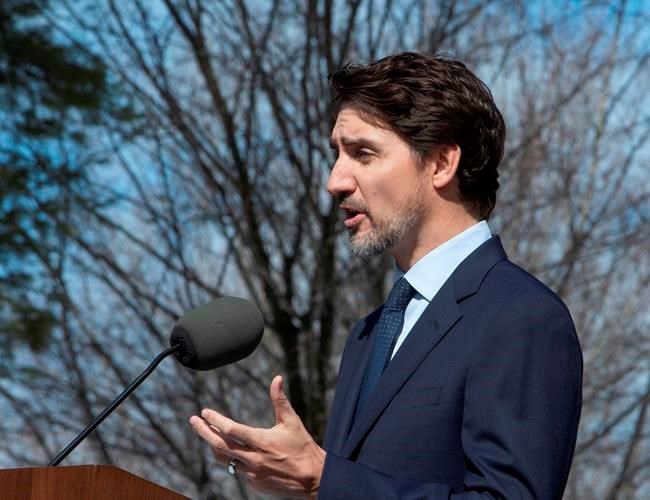OTTAWA — Prime Minister Justin Trudeau got thanks from Canada's premiers Friday for $11-billion in federal funding to confront the health and economic impact of the rapidly spreading novel coronavirus — but heard that much more will be needed to weather the crisis.
Trudeau, who is in self-isolation after his wife tested positive for COVID-19, held a 90-minute conference call with provincial and territorial leaders.
That was instead of the in-person, day-long meeting that had originally been planned.
While the first ministers were speaking over the phone, Finance Minister Bill Morneau announced that the federal government is making $10 billion available to businesses through a credit facility program.
That's on top of the $1 billion announced last week for provincial health care systems, research, protective equipment, support for workers and businesses and economic stabilization.
Several premiers welcomed the steps, but said there will need to be more.
"In our view, these are prudent and necessary moves but they are likely just first steps in what will ultimately be needed to protect public health, safety, jobs and the economy," Alberta Premier Jason Kenney told a news conference after the phone call.
He suggested "vigorous federal economic stimulus measures" will be needed on a scale similar to that provided during the 2008 financial crisis, which Kenney pegged at about two per cent of GDP, or about $40 billion.
Ontario Premier Doug Ford welcomed the billions Ottawa has already ponied up but also said more is needed.
"I joined my fellow premiers to press the federal government on the need to provide reassurance to Canadian businesses and Canadian families during this time of economic uncertainty," Ford said in a written statement following the call.
"We urge the federal government to work with the provinces to deliver the fiscal stimulus necessary to maintain stability and confidence in the Canadian economy."
A joint communique issued late Friday by the first ministers indicated that both federal and provincial governments are committed to spending what's required to revive the staggering economy.
"As the number of countries affected by COVID-19 increases, the risk of a domestic and international downturn also rises, given the impacts on supply and value chains, commodity prices, global financial markets, export markets and tourism," the communique said.
"First ministers agreed to take action and to support Canadians' economic well-being, including through fiscal measures where appropriate to mitigate economic impacts."
British Columbia's John Horgan said Trudeau told premiers that federal support for the provinces and territories will be allocated according to need, not on the usual per-capita basis. The lion's share of COVID-19 cases so far in Canada are among residents of Ontario and B.C.
Trudeau also heard calls to tighten controls over the entry of foreign visitors into Canada from Quebec Premier Francois Legault, Kenney and other premiers.
Horgan told a news conference that Canadian citizens returning from abroad are being asked to self-isolate for 14 days, so the country "should also be ensuring we're doing that for travellers who come" to Canada.
He said the federal government had already "responded to that in large measure" by announcing earlier Friday that international flights will be allowed to land at a limited number of airports to ensure better screening.
Manitoba Premier Brian Pallister said he was reassured by the call, in which he said first ministers shared with one another the various actions they're taking to try to curb the spread of COVID-19.
"I am bolstered in my confidence that as a nation we are dealing with the issue in an open and in a proactive way," he told a news conference.
Among other things, Pallister said first ministers discussed the need to support Canadians who don't qualify for Employment Insurance benefits and are not able to afford to take time off work, put their kids in daycare or stay in isolation for two weeks.
"I am very interested in and will pursue that conversation further with the federal government and my colleagues as to how we can better address some of those in high needs situations," he said.
Morneau indicated earlier Friday that the federal government is looking at ways to get financial support directly to Canadians who need it and will have more to say on the matter next week.
"First ministers agreed that no one should have to be concerned about job security and financial hardship should they require self-isolation," the final communique said. "They discussed ways to work together to support Canadian workers and businesses by providing supports such as sickness benefits."
Pallister said he suggested during the call that there may be at least one way in which federal, provincial and territorial governments can save money, by banding together, where possible, to get "volume discounts" on things like personal protective equipment.
This report by The Canadian Press was first published on March 13, 2020.
— With files from Kelly Geraldine Malone in Winnipeg and Dirk Meissner in Victoria.
Joan Bryden, The Canadian Press




